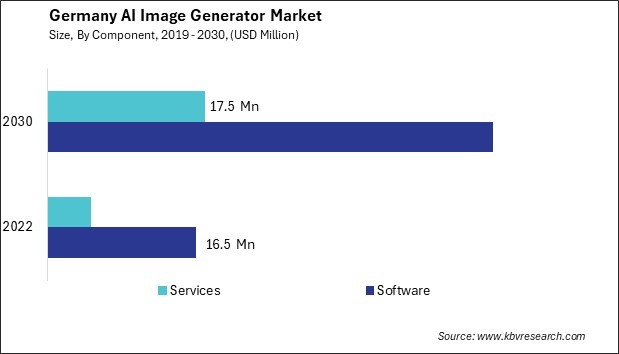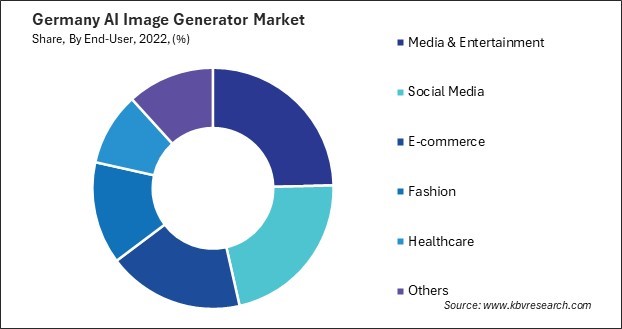Int'l : +1(646) 600-5072 | query@kbvresearch.com
Int'l : +1(646) 600-5072 | query@kbvresearch.com
Published Date : 14-May-2024 |
Pages: 42 |
Formats: PDF |
The Germany AI Image Generator Market size is expected to reach $66.9 Million by 2030, rising at a market growth of 15.5% CAGR during the forecast period.
The AI image generator market in Germany has witnessed significant growth in recent years, driven by advancements in AI technology and increasing demand for creative content across various industries. One of the key drivers of the AI image generator market in Germany is the rising adoption of AI-powered solutions across industries such as advertising, gaming, e-commerce, and digital media. Companies are increasingly leveraging AI image generators to automate generating high-quality images, thereby reducing production time and costs while maintaining visual consistency.

Additionally, the proliferation of big data and the availability of large-scale image datasets have facilitated the training of AI image generator models, enabling them to produce more accurate and diverse outputs. This has further accelerated the adoption of AI image generators among German businesses seeking to leverage AI-driven content creation and innovation solutions.
The COVID-19 pandemic has profoundly impacted the AI image generator market in Germany, both in terms of challenges and opportunities. As businesses across various industries shifted to remote work and digital-first strategies, the demand for AI-powered solutions, including image generators, surged. During the pandemic, many German businesses turned to AI image generators to maintain their marketing efforts, create compelling visual content, and adapt to changing consumer behaviors.
However, the pandemic also posed challenges for the AI image generator market in Germany, particularly in terms of supply chain disruptions, economic uncertainty, and shifting consumer preferences. Despite these challenges, the resilience and adaptability of German businesses, coupled with the innovative capabilities of AI technology, have enabled the AI image generator market to weather the impact of the COVID-19 crisis and emerge stronger than ever before.
In recent years, Germany has witnessed a significant surge in the popularity of AI-driven image generation, particularly within the entertainment and gaming industries. The entertainment industry in Germany, encompassing film, television, and digital media, has embraced AI image generation to enhance creativity and streamline production processes. With advancements in deep learning algorithms and generative adversarial networks (GANs), filmmakers and content creators now leverage AI to generate realistic visuals, special effects, and even entire scenes in Germany.
Similarly, the gaming industry in Germany has experienced a surge in AI-driven image generation, driven by the growing demand for immersive and visually stunning gaming experiences. German game developers increasingly use AI technologies to create high-fidelity graphics, lifelike characters, and dynamic environments. AI-powered tools enable German developers to generate vast amounts of content efficiently, from textures and animations to procedural level design, accelerating the game development and enabling greater scalability.
According to the International Trade Administration, as of 2022, Germany has witnessed a significant surge in the popularity of video and mobile games, with approximately six in ten Germans engaging in gaming activities. The average age of a German gamer is reported to be 37.9 years old. In the German industry, mobile gaming stands out with the largest player base, capturing the interest of around 20% of the population who utilize their smartphones for gaming purposes. Additionally, the prevalence of gaming consoles is noteworthy, as almost 30% of German households own at least one console. This burgeoning interest in gaming mirrors the rising prominence of the AI image generator market in Germany, as both industries witness substantial growth and adoption.
Moreover, the rise of virtual and augmented reality (VR/AR) technologies has further fueled the demand for AI image generation in Germany's entertainment and gaming sectors. As VR/AR applications continue to gain traction across various industries, the demand for AI-powered image generation solutions is poised to grow exponentially in Germany. Hence, the convergence of AI-driven image generation, propelled by advancements in deep learning and GANs, with Germany's burgeoning entertainment, gaming, and VR/AR industries marks a significant paradigm shift, fostering innovation and immersive experiences.
The AI image generator market in Germany is experiencing a surge in demand for visual content, driven by several factors that reflect evolving consumer preferences, technological advancements, and business requirements. There's a growing recognition among German businesses of all sizes regarding the importance of visual content in engaging audiences and communicating messages effectively. Whether for marketing campaigns, product presentations, or user interfaces, high-quality visuals are crucial in capturing attention and conveying information efficiently. As a result, German companies are seeking AI-powered image generators to streamline the process of creating compelling visuals at scale.
Moreover, the proliferation of social media platforms and digital channels has intensified the need for captivating visual content. In an era where attention spans are dwindling, eye-catching images and graphics are essential for standing out amidst online content. AI image generators in Germany generate custom images tailored to specific audiences and platforms, helping businesses maintain relevance and visibility in crowded digital spaces.
Additionally, advancements in artificial intelligence and machine learning algorithms have significantly enhanced the capabilities of image generation technology. Modern AI models analyze vast amounts of data, recognize patterns, and generate highly realistic images that closely resemble photographs taken by humans. Therefore, the surge in demand for AI image generators in Germany underscores the growing recognition of visual content's pivotal role in engaging audiences and staying relevant in today's digital landscape.

In Germany, the AI image generator market has witnessed a surge in companies leveraging cutting-edge technology to meet the growing demand for automated image creation solutions across various industries. One prominent player in the German AI image generator market is Pixolus GmbH. Based in Cologne, Pixolus specializes in developing AI-powered image recognition and generation solutions for businesses. Their technology enables automatic image generation for e-commerce, retail, and inventory management, helping companies streamline processes and enhance customer experiences.
Another key player in the AI image generator market is DeepArt GmbH, headquartered in Berlin. The company leverages deep learning algorithms to create artistic and realistic images. Their AI image generator platform allows users to transform photos into stunning artworks, catering to individual consumers and businesses seeking unique visual content. DeepArt's technology embodies the rich artistic tradition of Germany, blending innovation with cultural heritage to deliver compelling image generation solutions.
Additionally, Berlin-based Visometry GmbH is a leading provider of augmented reality (AR) and computer vision solutions. While not exclusively focused on image generation, the company's AR technology enables real-time image overlay and manipulation, enhancing visual experiences in various retail, manufacturing, and automotive applications. Their expertise in computer vision contributes to the advancement of AI-powered image generation capabilities within the German AI image generator market.
Furthermore, Frankfurt-based Imense GmbH focuses on AI-powered image recognition and generation for the healthcare sector. Their technology enables medical professionals to automatically generate and analyze medical images, aiding diagnosis, treatment planning, and research. Imense's solutions adhere to stringent medical regulations and privacy standards, making them suitable for integration into the German healthcare system.
In Hamburg, VisionLab GmbH specializes in AI-driven image processing solutions for industrial applications. Their technology enables automated quality control, defect detection, and product classification using advanced machine learning algorithms. The company's solutions cater to the manufacturing and logistics sectors, helping German companies optimize production processes and ensure product quality. These companies represent a diverse ecosystem of AI image generator market in Germany, each contributing unique expertise and innovation to meet the evolving needs of businesses across various industries.
By Component
By End-user